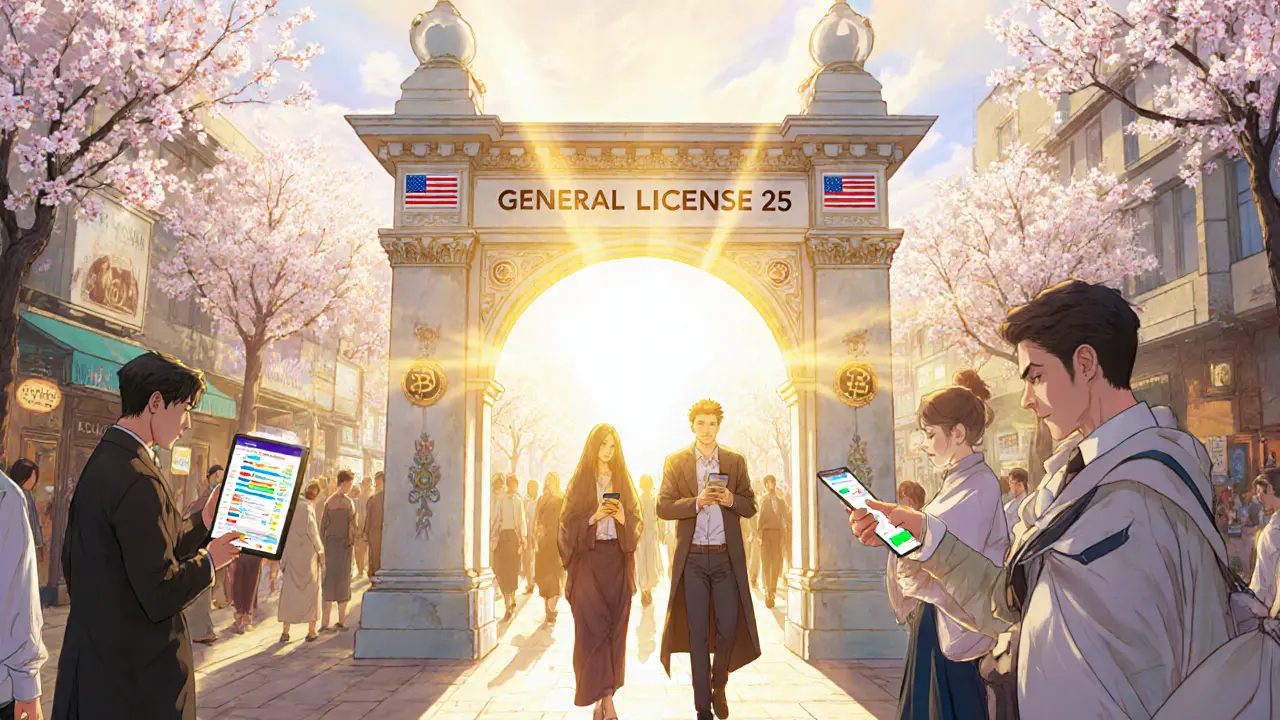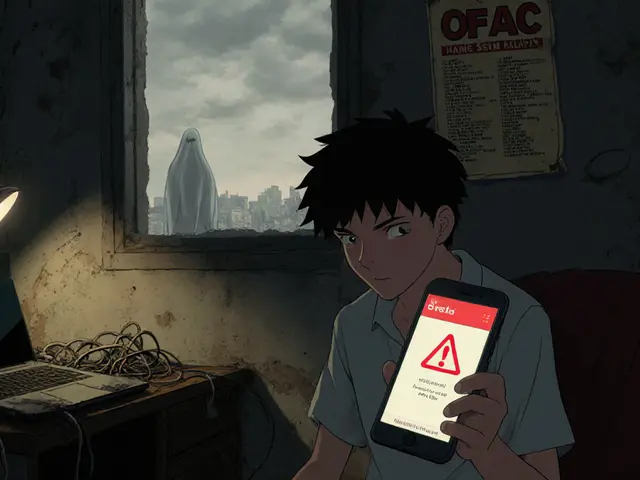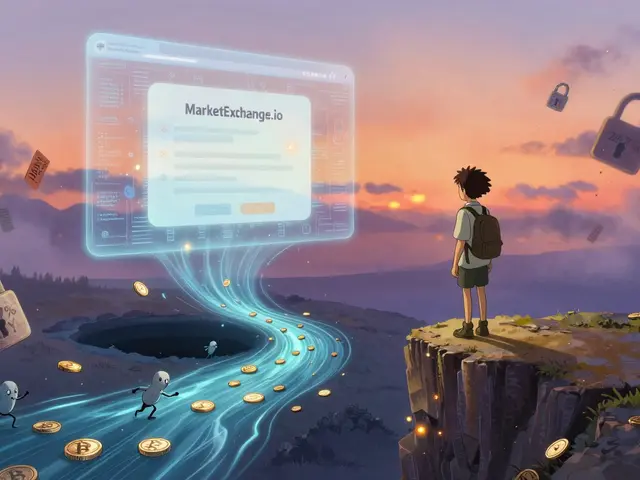23
How OFAC Sanctions Shaped Syrian Crypto Users in 2025

Syrian Crypto Compliance Checker
Check Your Eligibility
Enter information about your situation to determine if you can legally use U.S. crypto platforms under the new OFAC regulations.
Your Compliance Status
When the United States lifted its decades‑long blanket ban on Syrian financial activity, the crypto world felt a seismic shift. Office of Foreign Assets Control (OFAC) the Treasury bureau that administers U.S. economic sanctions announced a series of moves that turned a clandestine, work‑around‑heavy market into a nascent, legally‑accessible ecosystem. Below you’ll find the what, why, and how Syrian crypto enthusiasts can safely navigate the new landscape.
TL;DR
- July12025: comprehensive Syrian sanctions removed; crypto transactions with U.S. services become legal for most Syrians.
- General License25 (May282025) provides a blanket authorization for crypto‑related activities.
- Targeted sanctions still block over 100 regime‑linked individuals and entities - platforms must screen carefully.
- BIS’s License Exception SPP (effective Sept22025) opens the door for mining hardware and blockchain tech imports.
- Compliance best‑practice: use OFAC’s SDN list, PAARSS guidance, and FinCEN’s risk‑based approach.
Why Syrian Crypto Users Were in a Bind
Before 2025, the Syrian Sanctions Regulations (SySR) a set of U.S. rules that prohibited almost any financial interaction with Syrian entities meant that even a simple Bitcoin purchase on a U.S. exchange could trigger civil penalties up to $20million or criminal prosecution. The practical result was a patchwork of offshore wallets, peer‑to‑peer mixers, and a constant fear of freezing.
2025 Sanctions‑Relief Timeline
The relief unfolded in stages, each with a clear regulatory footprint.
| Date | Action | Impact on Crypto |
|---|---|---|
| May282025 | General License25 authorizes transactions otherwise prohibited by the Syrian Sanctions Regulations | Legal pathway to U.S. exchanges opened for non‑sanctioned Syrians. |
| June302025 | Executive Order14312 revoked six prior Syria‑related executive orders | Removed the legal foundation of the blanket ban. |
| July12025 | Effective date of the revocation | All SySR provisions ceased to apply. |
| August262025 | OFAC final rule stripped SySR from the CFR | Formal regulatory clean‑up; compliance manuals updated. |
| September242025 | Program renamed to PAARSS Promoting Accountability for Assad and Regional Stabilization Sanctions Regulations | Shift from blanket to targeted sanctions. |
| Sept22025 | BIS License Exception SPP Syria Peace and Prosperity effective | Mining rigs, servers, and blockchain hardware can be exported to Syria. |
General License25: The Crypto Gateway
General License25 is the workhorse for crypto activity. It says: if you’re not on the SDN List the Treasury’s Specially Designated Nationals and Blocked Persons list, you can transact with U.S. platforms. The license also covers:
- Buying, selling, and transferring digital assets.
- Using U.S. custodial wallets and decentralized finance (DeFi) protocols that meet KYC standards.
- Accessing blockchain‑as‑a‑service providers for smart‑contract deployment.
Importantly, the license does NOT waive the targeted sanctions on regime affiliates, Captagon traffickers, or Iran‑linked entities. That’s where compliance gets tricky.

What Remains Closed: Targeted Sanctions
Even after the blanket ban lifted, OFAC kept a list of over 100 individuals and entities tied to the Assad regime, human‑rights violators, and terrorist networks. Crypto platforms must run a two‑step check:
- Screen the user’s wallet address, IP, and identity against the SDN List.
- Apply PAARSS‑specific filters for entities still prohibited under the Global Terrorism Sanctions Regulations or the Foreign Terrorist Organizations Sanctions Regulations.
Failure to do so can trigger civil penalties or, in extreme cases, criminal charges.
Practical Steps for Syrian Crypto Users
- Verify your status: If you’re not a named individual on the SDN list, you’re likely eligible under General License25.
- Choose platforms that publicize OFAC‑compliant KYC procedures. Many U.S. exchanges added “Syrian user” checkboxes after August2025.
- Keep records of your transactions for at least five years. OFAC may request audit trails.
- Avoid using mixers or privacy‑focused services that lack clear compliance policies.
- Consider using a reputable custodial wallet that can produce a compliance report on demand.
What Crypto Platforms Must Do
Platforms serving Syrian customers now face a balancing act: open doors for millions while not accidentally processing a sanctioned transaction.
- Integrate real‑time SDN screening APIs that cover the latest OFAC updates.
- Implement risk‑based monitoring per FinCEN guidance the Financial Crimes Enforcement Network’s 2025 risk‑based approach for Syria‑related transactions.
- Document the decision‑tree used to approve or reject a Syrian user, citing General License25 and PAARSS.
- Train AML staff on the nuances of targeted sanctions versus the lifted blanket ban.
- Offer a clear “sanctions compliance” FAQ for users to reference.
Future Outlook: From Targeted Sanctions to Potential Full Normalization
OFAC has signaled intent to flesh out PAARSS with more interpretive guidance. If additional general licenses appear, we could see:
- Expanded permissions for DeFi lending protocols.
- Clear rules for stablecoin issuance tied to Syrian “digital rial” projects.
- Potential removal of the remaining 100‑plus targeted listings, paving the way for unrestricted access.
Until then, the safe route is to stay on top of OFAC releases, keep compliance tools up‑to‑date, and treat every Syrian client as a “high‑risk” case until proven otherwise.
Frequently Asked Questions
Can I legally buy Bitcoin on a U.S. exchange as a Syrian citizen?
Yes, provided you are not listed on the SDN List and the exchange has implemented OFAC’s screening requirements under General License25.
What happens if I accidentally trade with a sanctioned individual?
Both you and the platform could face civil penalties up to $20million per violation. Promptly report the incident to the exchange’s compliance team and consider filing a voluntary disclosure with OFAC.
Is mining equipment now allowed to be imported into Syria?
Yes. The Bureau of Industry and Security’s License Exception SPP, effective September22025, authorizes export of all EAR99 items-including ASIC miners and GPU rigs-without a separate license.
Do I still need to watch out for the Caesar Syria Civil Protection Act?
The State Department granted a 180‑day waiver in 2025, easing many of the act’s restrictions on infrastructure projects. However, the waiver is time‑bound, so keep an eye on extensions or renewals.
How can I verify that a platform is truly OFAC‑compliant?
Look for public statements referencing General License25, PAARSS, and FinCEN’s 2025 guidance. Ask the platform for their sanctions‑screening policy and any recent audit reports.







april harper
April 23, 2025 AT 23:06The dance of sanctions feels like a modern Sisyphus, constantly pushing the boulder of compliance uphill.
When OFAC finally lifts the blanket, the real struggle begins: navigating the fine cracks left behind.
Syrian crypto users now stand at a crossroads between newfound liberty and lingering shadows.
It’s a reminder that freedom, once granted, still demands vigilance.
Clint Barnett
April 25, 2025 AT 20:56Imagine a world where regulatory tides recede, only to reveal a reef of intricate rules that gleam like hidden treasure beneath the surface.
That is precisely what the 2025 OFAC liberation looks like for Syrian crypto enthusiasts-a sudden sunrise after a prolonged night of financial dusk.
First, the blanket ban has evaporated, leaving a sky dotted with new constellations of permissible activities, each demanding its own careful charting.
General License 25 acts as a lighthouse, guiding users toward legitimate exchanges while warning of jagged rocks in the form of targeted sanctions.
Platforms that have updated their KYC procedures now sparkle with transparency, allowing users to submit documents without fearing an invisible hand pulling the rug.
At the same time, the lingering list of over a hundred sanctioned entities looms like storm clouds, ready to unleash penalties for the unwary.
Compliance officers must therefore become cartographers, mapping every wallet address against the SDN list and the PAARSS filters, lest a stray transaction triggers a costly cascade.
The BIS License Exception SPP further adds a new dimension, making the import of mining rigs as routine as buying a new laptop, provided the buyer avoids the red‑flagged parties.
In practice, this translates to a routine of double‑checking, record‑keeping for at least five years, and steering clear of privacy‑focused mixers that refuse to disclose their source‑of‑funds logs.
Ultimately, the landscape is brighter, but only for those willing to walk the path with a lantern of diligence and a compass of regulatory awareness.
Jacob Anderson
April 27, 2025 AT 18:46Oh great, just when we thought the sanctions were a permanent art installation, the regulators decided to take a coffee break and move the pieces around.
Kate Nicholls
April 29, 2025 AT 16:36The overhaul certainly opens doors, yet the sheer volume of targeted listings means many Syrian users will still find themselves staring at a closed gate.
Platforms that rush to label everyone “eligible” without thorough screening risk severe penalties that could ripple back onto the broader crypto ecosystem.
In practice, a meticulous two‑step screening process is non‑negotiable, and users should keep detailed transaction logs to avoid surprises.
Carl Robertson
May 1, 2025 AT 14:26This “liberation” feels more like a staged drama where the real villains-hidden sanctions-still pull the strings behind the curtain.
If platforms ignore the lingering blacklist, they’ll become the next tragic protagonists in a courtroom saga.
Rajini N
May 3, 2025 AT 12:16The practical approach begins with confirming that your personal identifier does not appear on the OFAC SDN list.
Next, choose an exchange that publicly documents its OFAC‑compliant KYC workflow and provides audit logs upon request.
Maintain transaction records for a minimum of five years, storing them in a secure, searchable format.
Finally, avoid privacy‑centric mixers that lack transparent compliance policies, as they increase exposure to inadvertent sanctions breaches.
Sidharth Praveen
May 5, 2025 AT 10:06Seeing the sanctions lift is like the first rays of sunrise after a long night; it energizes the entire Syrian crypto community.
With the right tools-robust compliance software and vigilant record‑keeping-we can turn this opportunity into sustainable growth.
Let’s embrace the change, adopt best practices, and show the world that responsible crypto adoption thrives even in formerly restricted regions.
Sophie Sturdevant
May 7, 2025 AT 07:56While optimism is nice, the real engine here is the integration of AML‑KYC suites that can parse SDN data in real‑time, reducing false positives and ensuring transaction throughput stays high.
Platforms that fail to embed these modules will face bottlenecks and potential enforcement actions, which is unacceptable in a high‑velocity market.
Nathan Blades
May 9, 2025 AT 05:46The removal of blanket sanctions is not merely a policy shift; it is a philosophical rebirth of financial autonomy for a people long shackled by external edicts.
In the cryptographic realm, this translates to a canvas where code becomes law, and users become the architects of their own destiny.
However, every brushstroke must be guided by the twin beacons of legality and ethical responsibility, lest the masterpiece devolve into chaos.
Somesh Nikam
May 11, 2025 AT 03:36Absolutely, the new landscape feels like a fresh mountain trail-steep but rewarding.
Keep your compliance logs tidy, stay updated on the SDN list, and you’ll navigate the peaks without slipping 😊.
Jan B.
May 13, 2025 AT 01:26Check SDN, use compliant exchange, keep logs five years.
MARLIN RIVERA
May 14, 2025 AT 23:16If platforms ignore the granular PAARSS filters they are essentially signing their own death warrant, exposing themselves to multi‑million penalties that could cripple their operations.
Debby Haime
May 16, 2025 AT 21:06From a practical standpoint, the biggest win is the ability to import mining hardware without a separate license, which should accelerate local node deployment and decentralization.
Coupled with clear guidance from OFAC, it offers a roadmap for sustainable growth in the Syrian crypto sector.
emmanuel omari
May 18, 2025 AT 18:56Let it be clear: while the U.S. loosens its grip, regional actors must still respect sovereign interests; otherwise, the pendulum will swing back, and we’ll see renewed restrictions that hurt everyone.
Andy Cox
May 20, 2025 AT 16:46Just watching the compliance updates roll out feels like waiting for a bus that’s always a few minutes late but eventually shows up.
Courtney Winq-Microblading
May 22, 2025 AT 14:36The interplay between law and code creates a new dialect of freedom, one that whispers promises of empowerment while echoing the cautionary tales of past overreaches.
It invites us to reflect on the nature of sovereignty in the digital age.
katie littlewood
May 24, 2025 AT 12:26The 2025 OFAC reforms constitute a watershed moment that reshapes the economic topography for Syrian crypto participants, and the implications stretch far beyond mere transactional freedom.
First, the dissolution of the blanket ban dismantles the monolithic barrier that once forced users into opaque offshore networks, thereby reducing the reliance on high‑risk mixers and unregulated peer‑to‑peer channels.
Second, General License 25 operates as a universal passport, granting lawful access to U.S. platforms provided individuals are not listed on the SDN or other targeted sanction lists, effectively creating a tiered eligibility model.
Third, the persistence of a curated list of over one hundred regime‑linked entities means that compliance officers must adopt a dual‑layered screening protocol: an initial SDN check followed by a PAARSS‑specific filter for residual prohibitions.
Fourth, the BIS License Exception SPP simplifies the logistics of importing mining rigs, GPUs, and ASICs, turning what was once a bureaucratic nightmare into a straightforward commercial transaction.
Fifth, record‑keeping obligations have been codified, mandating a minimum five‑year retention period for all transaction logs, which encourages greater transparency and auditability.
Sixth, platforms that have updated their KYC frameworks now display compliance badges, offering users a visible assurance of regulatory alignment.
Seventh, the market response has been swift, with several U.S. exchanges launching “Syrian‑friendly” onboarding flows that include optional checkboxes to flag Syrian residency and trigger the appropriate compliance pathways.
Eighth, the risk landscape has shifted; while the macro‑level exposure has diminished, the micro‑level risk of inadvertent interactions with sanctioned individuals remains potent, necessitating continuous monitoring tools that can parse real‑time OFAC updates.
Ninth, educational initiatives spearheaded by fintech NGOs are emerging, providing tutorials on how to generate compliance‑ready reports, thereby empowering users to self‑audit.
Tenth, the broader geopolitical context suggests that this regulatory easing may be a strategic maneuver to encourage economic stabilization in the region, aligning with diplomatic objectives.
Eleventh, investors should note that the newfound legitimacy may attract institutional capital, potentially increasing liquidity and reducing spreads on Syrian‑linked crypto assets.
Twelfth, however, vigilance remains paramount; any misstep could trigger civil penalties that dwarf the financial gains, underscoring the need for robust internal controls.
Thirteenth, the lesson here is clear: opportunity and responsibility now walk hand‑in‑hand, and the community that embraces both will shape the future trajectory of crypto adoption in Syria.
Finally, staying abreast of OFAC bulletins, FinCEN advisories, and BIS licensing updates will be the keystone of sustainable participation in this evolving ecosystem.
Jenae Lawler
May 26, 2025 AT 10:16Nevertheless, one must question whether this regulatory leniency truly serves the Syrian populace or merely masks ulterior geopolitical motives.
Chad Fraser
May 28, 2025 AT 08:06Yo, this is the perfect time to hop onto a legit exchange, set up your wallet, and start building that crypto portfolio-let’s do it!
Jayne McCann
May 30, 2025 AT 05:56Honestly, I think the hype is overblown.
Richard Herman
June 1, 2025 AT 03:46While excitement builds, it’s essential we keep dialogue open between developers, regulators, and users to ensure policies evolve with real‑world needs.
Parker Dixon
June 3, 2025 AT 01:36Totally agree with the need for ongoing conversation 😊.
Keeping an eye on OFAC updates, sharing best‑practice guides, and fostering community workshops will help everyone stay compliant and confident.
Let’s keep the momentum going and support each other through this transition! 🚀
Stefano Benny
June 4, 2025 AT 23:26From a compliance architecture standpoint, the incremental de‑risking approach may inadvertently create siloed validation layers, leading to operational inefficiencies that outweigh the marginal gains of sanction relief.